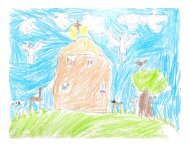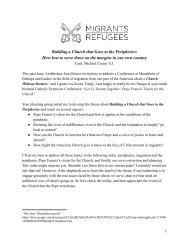Extension magazine - Spring 2024
What will be the impact of artificial intelligence on our world? Our article on page 24 considers how AI can assist as a helpful tool for the betterment of humanity, as well as its potential drawbacks. You will see images generated by a new AI system, Midjourney, that we prompted to create the cover of this magazine as well as vivid religious art. Also included is Pope Francis' 2024 address: "Artificial Intelligence and Peace."
What will be the impact of artificial intelligence on our world? Our article on page 24 considers how AI can assist as a helpful tool for the betterment of humanity, as well as its potential drawbacks. You will see images generated by a new AI system, Midjourney, that we prompted to create the cover of this magazine as well as vivid religious art. Also included is Pope Francis' 2024 address: "Artificial Intelligence and Peace."
You also want an ePaper? Increase the reach of your titles
YUMPU automatically turns print PDFs into web optimized ePapers that Google loves.
24 INSPIRE<br />
Cover Story<br />
<strong>Extension</strong> | <strong>Spring</strong> <strong>2024</strong> 25<br />
HOW CAN WE USE IT<br />
FOR THE BETTERMENT<br />
OF HUMANITY?<br />
ARTIFICIAL INTELLIGENCE IS for many a<br />
chilling technological revolution that has<br />
arrived at our doorstep. The notion that a<br />
robot can exceptionally mimic human intelligence<br />
is something that keeps many<br />
people up at night.<br />
Artificial intelligence has, in fact,<br />
been around for almost 70 years. The<br />
term “AI” was actually born in 1956<br />
through the emergence of cybernetics—the<br />
science of control in machines<br />
and humans. In the 1980s, AI gradually<br />
progressed with the rise of expert systems,<br />
which is the component of artificial<br />
intelligence that emulates the<br />
decision-making ability of a human<br />
expert. And now in the last 15 years,<br />
AI has progressed further thanks<br />
to massive data and new computing<br />
power. Many people are already<br />
familiar with the newest crop of<br />
AI tools like ChatGPT, which was<br />
launched in late 2022.<br />
So artificial intelligence has been<br />
here among us for quite some time.<br />
But like most technologies, it took<br />
a while to evolve. And now that it<br />
has, it is becoming a bigger part of<br />
daily life in society.<br />
As with any technological innovation,<br />
it has the potential to<br />
be used for good or evil, just like<br />
those that came before it. The<br />
cotton gin sped up textile production,<br />
but also prolonged the<br />
institution of slavery in the U.S.<br />
The industrial revolution created<br />
cheaper and more accessible<br />
goods, but also led to<br />
dangerous work conditions,<br />
greater pollution and child labor.<br />
Social media’s debut al-<br />
ARTIFICIAL<br />
ABOVE We prompted AI to create a<br />
realistic photo of the conversion of Saul<br />
as he is being blinded by a light from<br />
heaven on his way to Damascus, after<br />
which the former zealous persecutor of<br />
the Christian church becomes St. Paul<br />
the Apostle.<br />
lowed us to connect with old<br />
friends, but also gave way to<br />
easier dissemination of hate<br />
and disinformation.<br />
Many people feel that we<br />
are on the brink of perhaps<br />
another, even greater, revolution<br />
with the dawn of AI.<br />
In his January 1 message to<br />
the world, Pope Francis expressed<br />
a mix of sentiments:<br />
openness to this latest technology<br />
with a heavy dose of<br />
caution. He warned against<br />
any use of the technology<br />
that would distort reality; be<br />
used as a weapon of war; or<br />
in any way become detrimental<br />
to the well-being of<br />
the poor, the innocent and<br />
the young.<br />
“We rightly rejoice and<br />
give thanks for the impressive<br />
achievements of science<br />
and technology, as a result of<br />
which countless ills that formerly<br />
plagued human life<br />
and caused great suffering<br />
have been remedied,” said<br />
Pope Francis. “At the same<br />
time, techno-scientific advances,<br />
by making it possible<br />
to exercise hitherto unprecedented<br />
control over reality,<br />
are placing in human hands<br />
a vast array of options, including<br />
some that may pose<br />
a risk to our survival and endanger<br />
our common home.”<br />
You can read Pope Francis’<br />
full message, called “Artificial<br />
Intelligence and Peace,” on<br />
page 29.<br />
INTELLIGENCE<br />
IS HERE<br />
UPSIDE OF AI?<br />
Some speculate that AI offers<br />
tremendous benefits. Could<br />
it lead to more medical breakthroughs,<br />
even finding the cure to<br />
cancer? The pope said, “If artificial<br />
intelligence were used to promote<br />
integral human development,<br />
it could introduce important innovations<br />
in agriculture, education and<br />
culture; an improved level of life for<br />
entire nations and people; and the<br />
growth of human fraternity.”<br />
If we learn to use it appropriately<br />
and harness it ethically, AI could serve<br />
as an augmentation—and not a total<br />
replacement—of human intelligence.<br />
“Human” is the key word here. Humans<br />
must be the drivers of this technology.<br />
The technology should not drive us.<br />
According to an Associated Press<br />
report, the definition of artificial intelligence<br />
hits these four areas: AI helps<br />
to process data, AI<br />
does not have a mind<br />
of its own, AI depends<br />
on data that humans<br />
feed it, and AI produces<br />
results from human-fed<br />
information.<br />
Those last three points are essential in<br />
helping us understand artificial intelligence.<br />
AI is reliant on us human beings to tell it<br />
what we want it to create. Based on our instructions,<br />
our own thought-out prompting<br />
based on our human knowledge, emotions,














